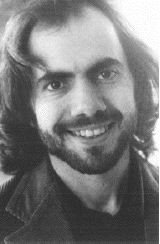
Maybe sometimes people come here to read this stuff and maybe sometimes people just zoom through on their way to another blog. Whatever. I think every once in awhile people stop in and see how I'm doing or what I am listening to. If you are stopping by and then zooming past, cool. If you are interested in what I think, God love ya. Either way, I wanted the picture of Steve Goodman to catch your eye. This is probably one of the top song writers of our generation that you have never heard of. I discovered his music a very long time ago when he was alive. Here is what Wikipedia has to say about Steve Goodman:
Steve Goodman
From Wikipedia, the free encyclopedia
Jump to: navigation, search
Steve Goodman (July 25, 1948–September 20, 1984) was an American folk music singer and songwriter.
Born on the north side of Chicago, Illinois, Goodman began writing and performing songs as a teenager, after his family had moved to the near north suburbs. While a student at Maine East High School[1] in Park Ridge, where he graduated in 1968, he began performing in Old Town and attracting a following[2]. By 1969, after a brief sojourn in New York City's Washington Square, Goodman was a regular performer at the well-known Earl of Old Town folk music club in Chicago, while attending Lake Forest College. During this time Goodman also married Nancy Pruter, and paid bills by writing and singing advertising jingles.
It was also during this time that Goodman wrote many of his most enduring songs, including "City of New Orleans", the song which would become most associated with Goodman. "City of New Orleans" won Goodman a posthumous Grammy Award for Best Country Song in 1984 for Willie Nelson's version. Goodman's songs first appeared on a locally-produced record, Gathering at the Earl of Old Town, in 1971.
In 1971, Goodman was playing at a Chicago bar called the Quiet Knight as the opening act for Kris Kristofferson. Kristofferson, impressed with Goodman, introduced him to Paul Anka who brought Goodman to New York to record some demos; these resulted in Goodman signing a contract with Buddah Records.
Seeing Arlo Guthrie in a bar, Goodman asked to be allowed to play a song for him. Guthrie grudgingly agreed on the condition that Goodman buy him a beer first; Goodman played "City of New Orleans" which Guthrie liked enough that he asked for the right to record it. Guthrie's version of the song became a hit in 1972, and provided Goodman with enough financial success to make his music a full-time career. The song would become an American standard, covered by many other musicians including Johnny Cash, Judy Collins, and Willie Nelson.
In 1974, singer David Allen Coe achieved considerable success on the country charts with Goodman's "You Never Even Call Me By My Name", a song which good-naturedly spoofed stereotypical country music lyrics.
Goodman's own success as a recording artist was more limited. Although known in folk circles as a great song writer and highly influential, his albums received more critical than commercial success.
Goodman's singing career remained centered around the folk music clubs of Chicago, and Goodman wrote and performed many humorous songs about the city, including two about the Chicago Cubs: "The Dying Cub Fan's Last Request" and "Go, Cubs, Go." Others included "The Lincoln Park Pirates", about the notorious Lincoln Towing Company, and "Daley's Gone," about Mayor Richard J. Daley. Another comic highlight is "Vegematic," about a man who falls asleep while watching late-night TV and dreams he ordered a slew of products he saw on infomercials. He could also write serious songs, most notably "My Old Man," a tribute to Goodman's father, Bud Goodman, a used car salesman.
Goodman was closely involved with the Old Town School of Folk Music, where he met and mentored his good friend, John Prine. Ironically one of Goodman's biggest hits was a song he didn't write; The Dutchman which he popularised, was written by Michael Peter Smith.
Around the time Goodman's career began to take off, he was diagnosed with leukemia. The entire time he was writing and singing, he was also fighting cancer. On September 20, 1984, Goodman died at University of Washington Hospital in Seattle, Washington . Eleven days later, the Chicago Cubs, the baseball team Goodman rooted for and wrote two songs about, would play their first play-off game since 1945 at Wrigley Field. Goodman's ashes are buried under home plate at Wrigley Field.
My favorite Steve Goodman songs:
1. Would You Like To learn To Dance?
2. Banana Republics
3. City of New Orleans
4. Donald and Lydia
5. I'm Attracted to You
He was to mentor to John Prine. That says volumes. I miss this guy, Jim Croce and George Harrison a lot. What a cool songwriter and performer. Buy all the Steve Goodman records you can.
Discography
Affordable Art (1983)
Artistic Hair (1983)
The Best of the Asylum Years, Volume One (1988) posthumous
The Best of the Asylum Years, Volume Two (1988) posthumous
City of New Orleans (1989) posthumous
The Easter Tapes posthumous
The Essential Steve Goodman (1976)
High and Outside (1979)
Hot Spot (1980)
Jessie's Jig and Other Favorites (1975)
Live Wire posthumous
No Big Surprise (compilation) (1994) posthumous
The Original Steve Goodman (1989) posthumous
Santa Ana Winds (1980)
Say It In Private (1977)
Somebody Else's Troubles (1972)
Steve Goodman (1972)
Unfinished Business (1987) posthumous
Words We Can Dance To (1976)
1 comment:
love Steve Goodman, nice to know he is remembered...
Post a Comment